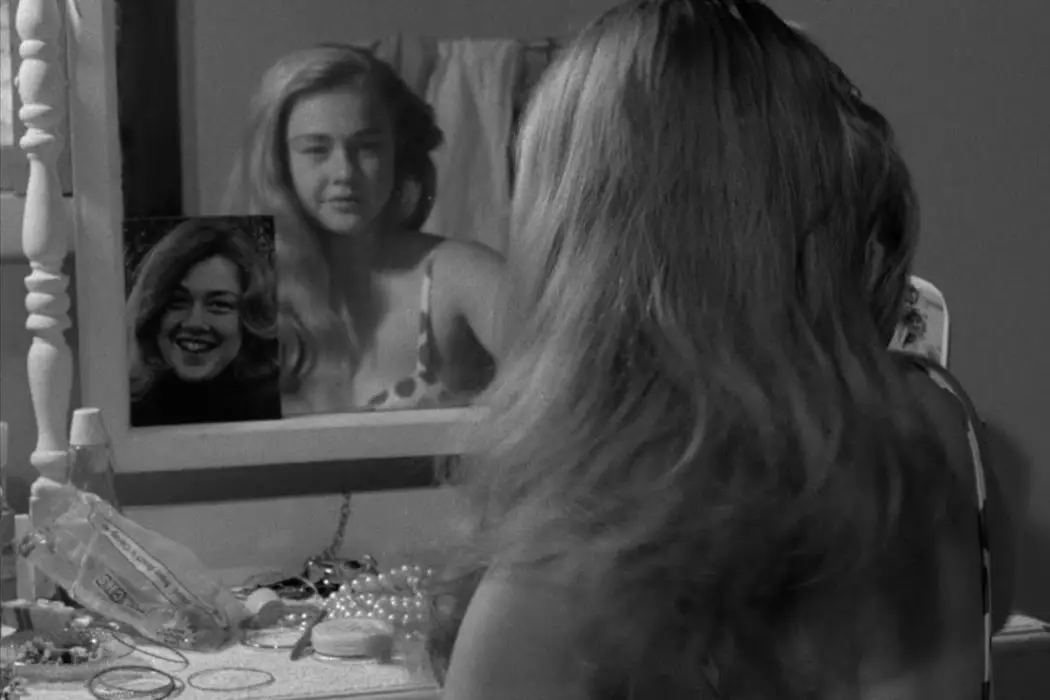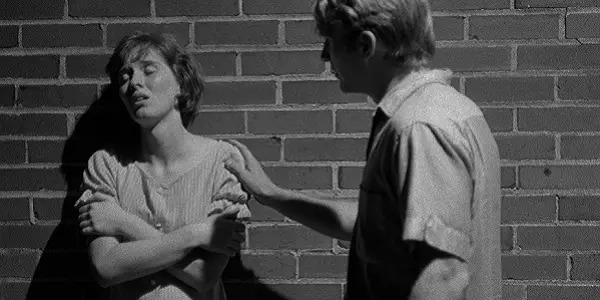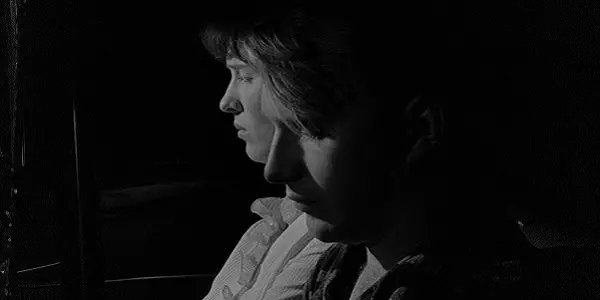SPRING NIGHT, SUMMER NIGHT: A Rediscovered Work of American Neorealism

Lee Jutton has directed short films starring a killer toaster,…
Ohio University film professor J.L. Anderson combined European filmmaking style with an entirely American setting — a tiny Appalachian mining town — in his debut feature as a director, Spring Night, Summer Night. Originally set to screen at the 1968 New York Film Festival, it was bumped to make room for John Cassavetes’ Faces and scarcely seen in its intended form after that. Indeed, the film’s distributor went so far as to have it recut as an exploitation film called Miss Jessica is Pregnant, complete with added nudity (of course).
The fate of Spring Night, Summer Night would seem to have been sealed, but thanks to a few powerful champions of the film — most prominently director Nicolas Winding Refn, who funded the film’s preservation and released it for streaming online via his by NWR platform — it is finally receiving the attention that should have been bestowed upon it more than 50 years ago. (It even got that long-awaited NYFF premiere in 2018.) Now available on Blu-ray courtesy of Flicker Alley, Spring Night, Summer Night is a breathtaking slice of mid-century American neorealism, from the raw performances of its mostly non-professional actors to its gorgeous on-location photography.
Born to Run
Jessie (Larue Hall) is the eldest daughter on a family farm in Canaan, Ohio, and the de facto head of the household. Her mother, Mae (Marj Johnson), spends most of her time drinking in bars with old flames and wondering how she ended up living such a dull life, while her father, Virgil (John Crawford), lives for betting on c*ckfights and reminiscing about his days in the U.S. Army. Both parents are stuck in the past, longing for the times when the town’s mines were active and money was flowing in, yet their children have known nothing else but this desperate, dusty struggle for mere survival. In addition to Jessie, that includes Carl (Ted Heimerdinger), the eldest son from Virgil’s previous marriage.

One night, the majority of the family makes their way down to the local watering hole for a night of dancing and drinking. From the bluegrass band providing the soundtrack to the thick clouds of smoke lingering in the air to the floor filled with tipsy, delighted dancers, it’s clear that this is the closest the town’s residents get to feel truly free. That is, except for Carl. Watching his pretty half-sister dance with the local boys eats away at him until he explodes in a jealous fit of rage, dragging Jessie from the bar to his car. We watch them argue from outside the vehicle, unable to hear what they are yelling about and left to read the violence of their facial expressions and body language.
What follows next is an act of incest, one that both siblings clearly feel uncomfortable and guilty about afterward; Jessie lies on her back staring into the night sky with a disturbed expression as Carl pulls his pants on at a distance. At that moment, the film doesn’t make it explicit as to whether or not Jessie has consented, though she later muses “I could have stopped you.” Whether she truly wanted it at that moment or is just trying to erase some of her half-brother’s considerable guilt over the situation, one thing is certain: their illicit tryst got Jessie pregnant.
Hungry Heart
Shortly after that fateful night, Carl takes off to Columbus to work and doesn’t return for months; when he does come back home, with the object of taking his beloved Jessie away with him, he is greeted by Jessie’s bulging belly and Virgil’s angry quest to determine which local boy is the father. The knowledge that Jessie is expecting his child makes Carl all the more determined to run away with her and start a new life where no one will know about their shared blood. Jessie is less enthusiastic about the prospect — she doesn’t seem to be “in love” with Carl in the way he is with her — but doesn’t have any better alternatives to propose.

Before they run away, Carl and Jessie decide to dig into some old rumors and confirm whether they do indeed share blood after all. Is Virgil really Jessie’s father, or is it actually one of Mae’s many ex-lovers? Is it possible to determine the truth without revealing the scandalous truth about Jessie’s pregnancy to their parents? It’s an unfortunate situation that can only lead to heartbreak for all involved.
That it takes something as extreme as a (possibly? probably?) incestual pregnancy to break Jessie and Carl out of the never-ending doldrums of their daily lives and force them to start anew shows us just how powerful the pull of the familiar is, even when that familiar is the dire poverty of a depressed town long past its peak. For Mae, Virgil and so many others, it’s easier to daydream about the past when things were different than to try and change the present, especially with the lack of opportunities available to them. But Carl and Jessie have an excuse to get away. They also have each other — and however disturbing that might be, one cannot deny the connection between the two of them. Jessie doesn’t seem to have the passion for Carl that he does for her, but he is nonetheless the only person in town with whom she can speak honestly.
Greatly influenced by Italian neorealism, Anderson spent an extended amount of time painstakingly scouting shooting locations for Spring Night, Summer Night; the result is a film where the environment feels just as important a character in the story as the human protagonists. Photographed in black-and-white by Brian Blauser, David Prince, and Art Stifel, the empty fields and dying towns of the Rust Belt are rendered strangely beautiful, with an undercurrent of sadness. Indeed, many key moments are rendered almost abstract in how they are photographed and edited, giving Spring Night, Summer Night a surprisingly poetic feel. Some of the performances are rather stilted, but even that doesn’t take away from the film’s quality; if anything, these awkward expressions of emotion only add to the rawness and the realism of the film.

Many have compared Spring Night, Summer Night to Barbara Loden’s Wanda, another iconic depiction of Rust Belt ennui, and Peter Bogdanovich’s The Last Picture Show, another black-and-white portrait of young people struggling to get out of a dead-end town. Both of these comparisons are extremely valid. Yet in the inherent tragedy of Jessie and Carl’s desperate situation I also found myself thinking of Nicholas Ray’s classic They Live by Night, and the doomed young lovers at its center. Both films show us how difficult it can be for poor young people to pull themselves out of the mire, especially when it feels like the system is rooting for them to drown in it. While incest is not a factor in They Live By Night, Keechie and Bowie’s plan to flee the law and live an honest life together, away from anyone who knows about their checkered pasts, is not many miles off from what Carl and Jessie also desire. That the earlier film has an unhappy ending can also be seen as a portent for the struggle that awaits the young couple at the center of Spring Night, Summer Night; we’re left rooting for Jessie and Carl to find some kind of happy ending while fully knowing that, for these troubled young people, it might not be within reach.
Conclusion
It has been a long wait for audiences to see Spring Night, Summer Night the way it was meant to be seen, but it was worth it. If nothing else, the film serves as a remarkable example of why funding the preservation, restoration, and release of older films is so important. Without the efforts of Refn and so many others, Spring Night, Summer Night might have been lost forever.
What do you think? What almost-forgotten films do you want to see restored? Share your thoughts in the comments below.
Spring Night, Summer Night was released on Blu-ray by Flicker Alley on May 26, 2020.
Watch Spring Night, Summer Night
Does content like this matter to you?
Become a Member and support film journalism. Unlock access to all of Film Inquiry`s great articles. Join a community of like-minded readers who are passionate about cinema - get access to our private members Network, give back to independent filmmakers, and more.
Lee Jutton has directed short films starring a killer toaster, a killer Christmas tree, and a not-killer leopard. Her writing has appeared in publications such as Film School Rejects, Bitch: A Feminist Response to Pop Culture, Bitch Flicks, TV Fanatic, and Just Press Play. When not watching, making, or writing about films, she can usually be found on Twitter obsessing over soccer, BTS, and her cat.












